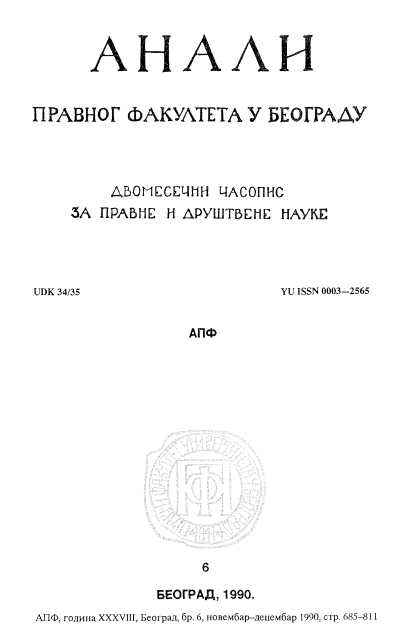ЗНАЧАЈ КРИВИЦЕ КАО ПРЕТПОСТАВКЕ ЗА НАСТУПАЊЕ УГОВОРНЕ ОДГОВОРНОСТИ
THE SIGNIFICANCE OF FAULT AS A PREREQUISITE FOR TAKING PLACE OF CONTRACTUAL LIABILITY
Author(s): Ivica JankovecSubject(s): Civil Law
Published by: Правни факултет Универзитета у Београду
Keywords: Contractual liability; Violation of contract; Debtor's fault
Summary/Abstract: 1. The issue of significance of fault of debtor for taking place of contractual liability depends on distinguishing the cases of a debtor not meeting his obligation, or being late in his performance, on the one hand, and the cases where debtor has incorrectly discharged his obligation. 2. Debtor is liable, in principle, if at fault for not discharging or for delay in discharging contractual obligation or for delay in discharging contractual obligation. Contrary to that, if the impossibility of discharging the obligation was due to an Act of God, the debtor shall not be liable for demage onflicted to the other party. However, he shall be liable even in the absence of his fault if his obligation relates to a generic action, or if the impossibility of discharging the obligation took place ofter his being late, if he is liable for delay. 3. The debtor is liable for not meeting his obligation or for delay regardless of his fault, if the event causing the impossibility should be considered a risk of the debtor for the success of the deal. Debtor, namely, should not be liable if the discharge of the obligation became impossible due to circumstances which, due to the nature of the transaction or due to the intent of the parties, belong outside the sphere of risk (of debtor). Liability for not discharging contractual obligation, as well as the one for delay, should be based on the principle of equitable distribution of risk for the succès of contracted deal between the debtor and the creditor. 4. Debtor shall be liable regardless of his fault regarding the impossibility for discharging the obligation if so provided by law for the specific kind of contractual relations, or if he had assumed guaranty for regular discharge of his obligation. 5. For incorrect performance out of a contract involving charge, as a rule, the debtor is liable even without being at fault. This liability should be based on the principle of equivalency of contractual commitments. 6. The issue of existence of debtor's fault for a violation of contract should be evaluated by refferring to the standard of care of a good master of the house, good businessman or good expert — depending on the kind of contractual relationship. 7. The taking place of contractual liability of the debtor is not affected by the degree of his fault.
Journal: Анали Правног факултета у Београду
- Issue Year: 38/1990
- Issue No: 6
- Page Range: 685-701
- Page Count: 17
- Language: Serbian

